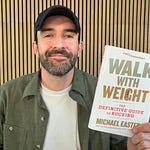Post Summary
Organic food is touted to be healthier than conventional—but is it? And if it is, are the health benefits worth its higher cost?
We spoke to Dr. Bobby Dubois, a physician who also earned a Ph.D. in health policy and thinks deeply about the tradeoffs between health benefits and their very real costs.
We discussed the evidence around organic food and health, how to think about health spending, and much more.
Watch our conversation in the video above or listen to it below.
Below you’ll also find a list of the topics we covered, links to scientific sources, a transcript for the readers, and more.
Housekeeping
This post, like all Monday Two Percent posts, is free to all subscribers. Enjoy!
Become a Member if you want full access to all three of our weekly posts, full archive, and much more. You may be able to expense it—here’s how.
ICYMI:
On Wednesday, we covered a missing piece in the fight against dementia and 6 tactics to future-proof your brain.
On Friday, we ran a SUPERMEDIUM-inspired Burn the Ships workout.
Thanks to our partners:
Momentous made me feel good about supplements again. They’re trusted by pro sports teams, the U.S. military—and Two Percent. My picks: Essential Plant Protein + Creatine. Use discount code EASTER for 35% off.
GOREWEAR designs endurance gear for Two Percenters. I love their Concurve 2-in-1 Shorts for trail runs and gym workouts. Use code EASTER for 30% off your next order.
Jaspr air purifiers. I consider Jaspr my #1 home health tool. As you’ll learn today, most health-promoting things require effort—but Jaspr is an exception. Just plug it in and remember to breathe. Get a discount through this link.
Audio version
Listen to my conversation with Dr. Bobby here:
The post
We’re told organic food is healthier. We also all know it’s more expensive—50 percent on average. But does science actually suggest organic food is any healthier? And if yes, do those health benefits offset its higher cost, or would our money be better spent elsewhere?
My friend Dr. Bobby Dubois was recently grappling with these questions on his podcast, Live Long & Well with Dr. Bobby.
Dr. Bobby is a great person to analyze these questions—he literally does it for a living.
Dr. Bobby is a physician, but he also earned a Ph.D. in health policy and has published 180 studies on how to weigh the possible benefits of a health practice against its very real costs.
I chatted with Dr. Bobby about organic food last week. Watch our conversation in the video above, or listen to it in the audio bar. I’ve also included a transcript below for those who prefer to read.
Here’s what we covered:
Real costs: How much more expensive organic foods are (50 percent on average) with real-world examples from Bobby’s recent excursion to a grocery store.
The health evidence: What the data really says about organic food and health.
Cancer risks: How pesticides used in conventional foods alter your risk of cancer and other diseases (the numbers may surprise you).
The bigger picture: Why eating more fruits and vegetables overall may be more powerful than eating organic.
Smart choices: Which organic foods may be worth the cost, and which probably aren’t.
Hidden downsides of organics: Shorter shelf-life, more risk of bacteria, slower turnover rate at grocery stores, different pesticide profile, and more.
Kids and organics: Whether organic food may be more beneficial for children.
Money-saving strategies: How to buy organic without breaking the bank.
Philosophy: How to think about the money you spend on your health.
Stats and Sources
Americans spend about $3,100 a year on groceries. That’s $1000 to $1,600 a month for a family of four.
Organic foods cost on average 50 percent more, meaning a family of four would spend anywhere from $3,000 to $6,000 more a year on groceries if they bought organic.
Organic foods have lower levels of pesticide residues.
Multiple meta-analyses show there’s no clear health benefit to organic produce.
Research shows organic eaters have lower pesticide levels in their blood, but they didn’t seem to have fewer diseases.
One study found “there was little or no decrease in the incidence of cancer associated with consumption of organic food, except possibly for non-Hodgkin lymphoma.”
Another observational study found 0.6 percent fewer cancers in people who ate organic, but the people also tended to eat healthier in general, smoked less, and were younger and thinner.
One meta-analysis found that eating 5 versus 2 servings of fruits and vegetables a day (conventional) led to a 13 percent reduction in mortality, and a 35 percent reduction in cancer.
80 percent of people don’t get five servings of fruit and vegetables a day.
One study estimated that if half of Americans ate one more fruit and vegetable a day, we’d have 20,000 fewer cancer cases and 10 more cancer cases from pesticides. That means 19,990 people would be better off.
Transcript
For the readers out there, here’s a link to the transcript.
You can also view it by clicking the page icon in the video player bar.
Let us know your thoughts on organic food in the comments.
Have fun, don’t die, eat more fruits and vegetables.
-Michael








